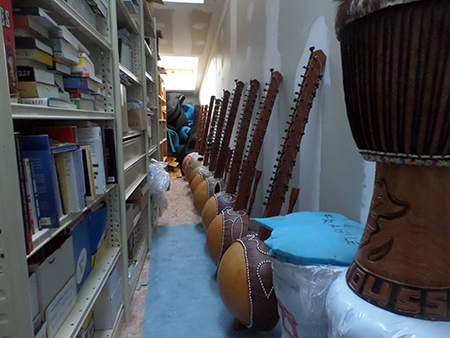As part of the research project "Stolen Moments" initiated by the AMA and the National Archives Namibia, the communication scientist Aino Moongo and the musician Baby Doeseb from Windhoek will conceive an exhibition and concert series on Namibian pop music from the 1950s to the 1980s. The research project is funded by the German Federal Cultural Foundation( Kulturstiftung des Bundes).
The research project "Festivalisation and Interculturality - Music Festivals in Africa and Germany" has been started. We will look at representations of Africa at African music festivals in German speaking countries. At a later stage we will focus on music festivals in different African countries. The project is funded by the Centre for Intercultural Studies at Johannes Gutenberg University Mainz.
The archive is available to all researchers. Please contact us.

Research Focus Anthropology of Music
Anthropology of Music – Website
We are a working group of cultural anthropologists who engage in and promote the anthropological study of music and sound at Johannes Gutenberg-University Mainz, Germany (JGU). Our goal is to render the study of sonic phenomena an established anthropological field, much like "ethnomusicology" is within musicology. To this aim, we try to bring forward and institutionalize the anthropological study of music and sound by
- doing and furthering research worldwide on whatever you can hear,
- teaching classes on music and anthropologies of music and sound in BA and MA programs,
- organizing academic events like lectures and conferences (most prominently a biennial "Anthropology of Music Lecture Series and Master Class"),
- organizing public events like discussions or lecture-concerts.
We are interested in all kinds of music and sound from around the world. Being part of the of the Department for Anthropology and African Studies (ifeas) at JGU, however, we share a special interest in African music. With a unique collection of African popular music, the "African Music Archives" (AMA), also situated at the ifeas, is the most prominent expression of this general orientation.
(Source: https://anthropologyofmusic.com/about/; 01.06.2021/10:40)
Liturgical music as a place of emancipation for African nuns?
Kora and emancipation in secular and liturgical music
Research Project by Dr. K. Langewische (Researchfellow at the Ifeas) and Dr. H. Dorsch (AMA Director)
The founders of the Keur Moussa monastery in Senegal came from Solesmes monastery in France, which since its new foundation by Dom Guéranger has distinguished itself which the tradition of Gregorian chant. In the wake of the Second Vatican Council, the Benedictine monks endeavoured to adapt the music to African conditions and introduced the Kora as a liturgical instrument. After many years of experimentation, the West African Griots’ instrument, which was played primarily by men from certain families of musicians, became, in the hands of the monks of Keur Moussa, an instrument played internationally by men and women and used for liturgical music throughout West Africa. The Mandingos’ instrument has been transformed into a chromatic scale instrument, produced in Keur Moussa and sold worldwide.
From the monastery of Keur Moussa in Senegal, we will follow the musical networks, which lead us, among others, to the monasteries of Burkina Faso, Benin and France, to find answers to our research questions: the feminisation of the liturgy as a secondary effect of acculturation, the exercise of the kora and Gregorian chant by women, as well as the cooperation or competition between monks and nuns concerning the commercialisation of liturgical music.
During the 2nd research phase we would like to go further in our questioning as well as explore the process of feminisation thoroughly: To what extent has the opening of the Kora playing for women by the Keur Moussa monastery also contributed to making this instrument more accessible to secular women, or conversely has the recent emergence of female Kora players in the Global North influenced nuns in Africa?
(Source: https://www.blogs.uni-mainz.de/fb07-ifeas-eng/liturgical-music-as-a-place-of-emancipation-for-african-nuns/ ; 01.06.2021/10:57)

Publications of the AMA-Director accessible online:
"Music is the Weapon - Zur neuen Bedeutung von Musikern und der entstehenden Musikindustrie in Afrika" auf aktion-deutschland-hilft.de (2012)
"Indépendance Cha Cha - Afrikanische Popmusik in der Unabhängigkeitsära" auf zeitgeschichte-online.de (2010)
"Indépendance Cha Cha: African Pop Music since the Independence Era" in Africa Spectrum 45.3 (2010)
"Die afrikanische Diaspora im Konzertsaal - Musik als Heimat" auf journal-ethnologie.de (2003)